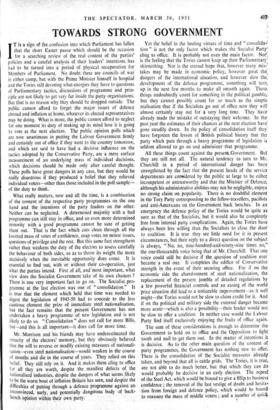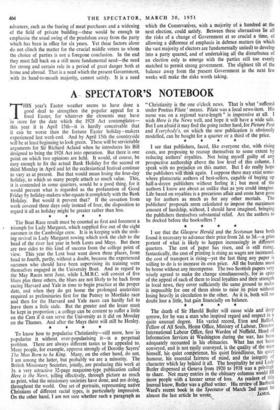TOWARDS STRONG GOVERNMENT
IT is a sign of the confusion into which Parliament has fallen that the short Easter pause which should be the occasion for a searching review of the real content of the parties' policies and a careful analysis of their leaders' intentions has had to be turned into a period of physical recuperation for Members of Parliament. No doubt there are councils of war in either camp, but with the Prime Minister himself in hospital and the Tories still devoting what energies they have to questions of Parliamentary tactics, discussions of programme and prin- ciple are not likely to get very far inside the party organisations. But that is no reason why they should be dropped outside. The public cannot afford to forget the major issues of defence abroad and inflation at home, whatever its elected representatives may be doing. What is more, the public cannot afford to neglect for one moment its duty of making up its mind how it is going to vote at the next election. The public opinion polls which are now unanimous in putting the Labour Government firmly and certainly out of office if they went to the country tomorrow, and which are said to have had a decisive influence on the tactics adopted by the Conservative Party, are a mere surface measurement of an underlying mass of individual decisions, which decisions should be made only after careful thought. These polls have great dangers in any case, but they• would be really disastrous if they produced a belief that they relieved individual voters—other than those included in the poll sample— of the duty to think.
What really matters, now and all the time, is a combination of the content of the respective party programmes on the one hand and the intentions of the party leaders on the other. Neither can be neglected. A determined majority with a bad programme can still stay in office, and an even more determined minority with a good programme cannot be sure of getting them out. That is the fact which cuts clean through all the knotted mass of votes of confidence, snap votes on minor issues, questions of privilege and the rest. But this same fact strengthens rather than weakens the duty of the electors to assess carefully the behaviour of both sides, so as to throw its weight the more decisively when the inevitable opportunity does come. It is essential to find out, with or without their co-operation, just what the parties intend. First of all, and-most important, what view does the Socialist Government take of its own chances ? There is one very important fact to go on. The Socialist pro- gramme at the last election was one of "consolidation." It is true that the element which held that time was needed to digest the legislation of 1945-50 had to concede to the less cautious element the prize of immediate steel nationalisation, but the fact remains that the present Government has not undertaken a heavy programme of new legislation and is not likely to do so. " Consolidation " does not call for more Bills, but—and this is all important—it does call for more time.
Mr. Morrison and his friends may have underestimated the tenacity of the electors' memory, but they obviously believed that the will to reverse or modify existing measures of nationali- sation—even steel nationalisation—would weaken in the course of months and die in the course of years. They relied on this belief. They still rely on it. And it makes them cling to office for all they are worth, despite the manifest defects of the nationalised industries, despite the dangers of what seems likely to be the worst bout of inflation Britain has seen, and despite the difficulties of putting through a defence programme against an unconvinced, surly, and potentially dangerous body of back- bench opinion within their own party. Yet the belief in the healing virtues of time and "consolida•1 tion " is not the only factor which makes the Socialist Party' cling to office. It is probably not even the main factor. Noe: is the feeling that the Tories cannot keep up their Parliamentary' skirmishing. Nor is the eternal hope that, however many mis-/ takes may be made in economic policy, however great the, dangers of the international situation, and however slow the development of the defence programme, something will turn, up in the next few months to make all smooth again. These, things undoubtedly count for something in the political gamble,. but they cannot possibly count for so much as the simple' realisation that if the Socialists go out of office now they will almost certainly stay out for a very long time. They have already made the mistake of outstaying their welcome. In the' past year the estimates of their chances at the next election have' gone steadily down. In the policy of consolidation itself they' have forgotten the lesson of British political history that the party which puts through a heavy programme of legislation is seldom allowed to go on and administer that programme.
All these things count against the present.Government. But they are still not all. The natural tendency to turn to Mr. Churchill in a period of international danger has been strengthened by the fact that the present heads of the service departments are contidered by the public at large to be either incompetent or untrustworthy and that the Minister of Defence, although his administrative abilities may not be negligible, enjoys no strong claim on popularity. There is no doubtful element in the Tory Party corresponding to the fellow-travellers, pacifists and anti-Americans on the Government back benches. In an emergency the defence policy of the Tories would be quite as sure as that of the Socialists, but it would also be completely free from internal party complications. Again, the Tories have always been less willing than the Socialists to close the door to coalition. It is true they see little need for it in present circumstances, but their reply to a direct question on the subject is always. " No. no. nine-hundred-and-ninety-nine times no," the one-thousandth voice being that of Mr. Churchill. That one voice could still be decisive if the question of coalition ever became a real one. It completes the edifice of Conservative strength in the event of their securing office. For if on the economic side the abandonment of steel nationalisation, the replacement of the present jumble of detailed regulations by a few powerful financial controls and an easing of the world price situation did lead to a noticeable improvement—as it well might—the Tories would not be slow to claim credit for it. And if on the political and military side the external danger became more acute—which is also a possibility—their leader would not be slow to offer a coalition. In neither case would the Labour Party find itself exclusively enjoying the fruits of office again.
The sum of these considerations is enough to determine the Government to hold on to office and the Opposition to fight tooth and nail to get them out. In the matter of intentions it is decisive. As to the other main question of the content of party programmes, the Government has nothing new to offer. There is the consolidation of the Socialist measures already taken, and beyond that all is cattle grids. The Tories, it is true, are not able to do much better, but that which they can do would probably be decisive in an early election. The repeal of the Steel Act, which would be bound to give a fillip to business confidence ; the removal of the last vestige of doubt and hesita4 tion from foreign and defence policy, which would be bound to reassure the mass of middle voters ; and a number of quick advances, such as the freeing of meat purchases and a widening of the field of private building—these would be enough to emphasise the usual swing of the pendulum away from the party which has been in office for six years. Yet these factors alone do not clinch the matter for the crucial middle voters to whom the choice of parties is not a foregone conclusion. In the end they must fall back on a still more fundamental need—the need for strong and certain rule in a period of great danger both at home and abroad. That is a need which the present Government, with its hand-to-mouth majority, cannot satisfy. It is a need which the Conservatives, with a majority of a hundred at the next election, could satisfy. Between these alternatives lie all the risks of a change of Government at so crucial a time, of allowing a difference of emphasis in defence matters (in which the vast majority of electors are fundamentally united) to develop into a party quarrel, and of undertaking all the disturbance of an election only to emerge with the parties still too evenly matched to permit strong government. The slightest tilt of the balance away from the present Government in the next few weeks will make the risks worth taking.































 Previous page
Previous page